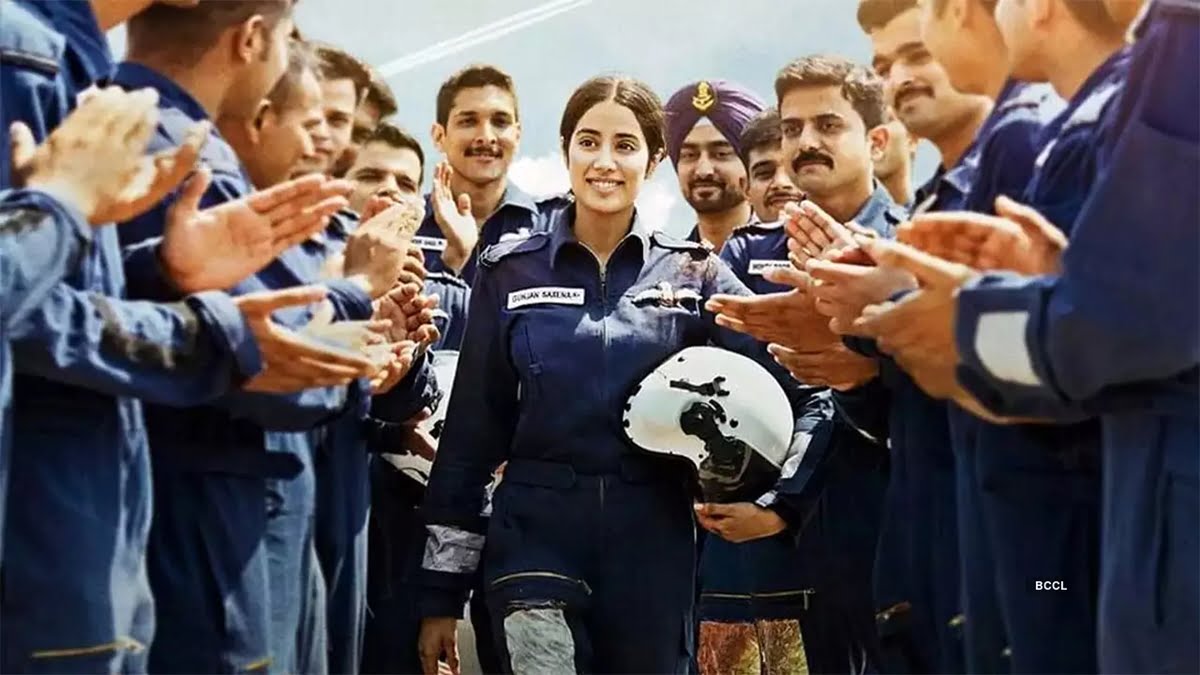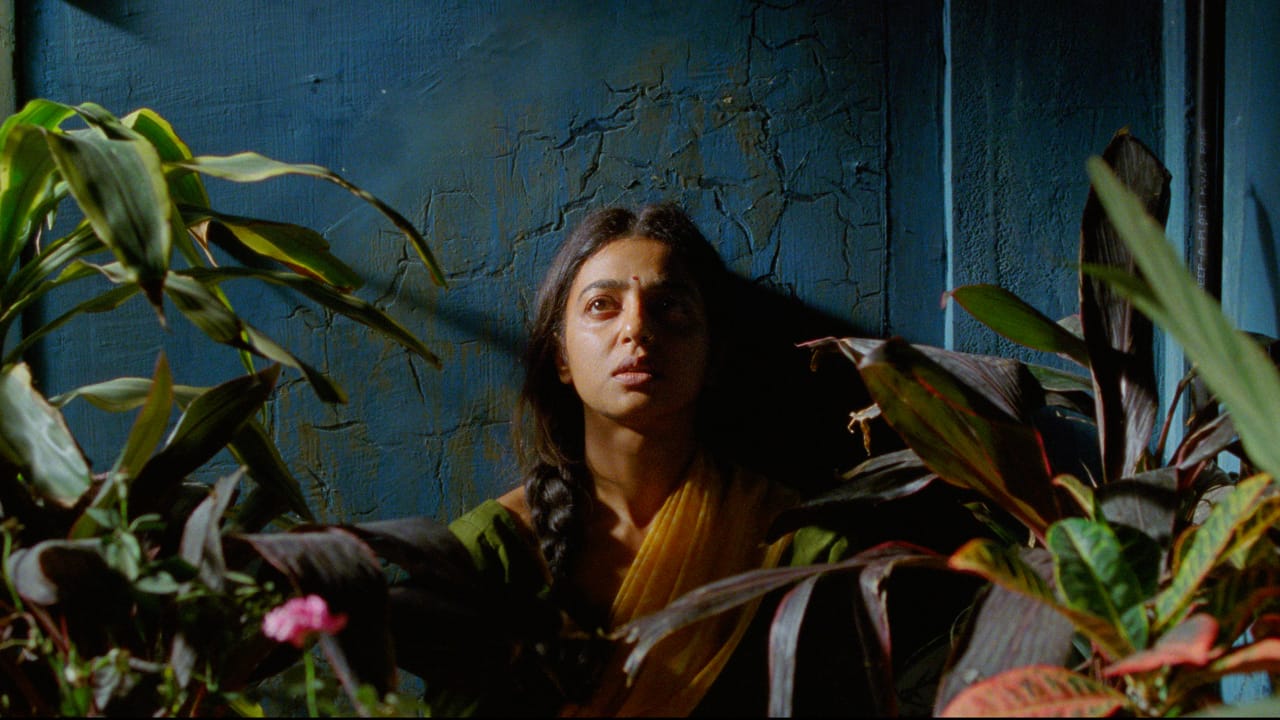When my father landed on Netflix’s ‘Gunjan Saxena: The Kargil Girl’ for our wind-down movie for the night, I knew I would be anything but that at the end of it. Bollywood’s take on the “inspirational” biopic (I use this term as loosely as Bollywood does) is notorious for its story-driving sensationalism, overt and deliberate nationalistic undercurrent and – when women are the focus – “well meaning” paternalism. Chak De India, Mary Kom and Dangal are but some mainstream examples of Bollywood’s attempt at telling the story of women breaking boundaries – i.e. “doing the man thing” – replete with the above. I, correctly, didn’t expect the telling of Gunjan Saxena’s story to be any different.
Bollywood’s latest take on the “inspirational” biopic of Gunjan Saxena is notorious for its story-driving sensationalism, overt and deliberate nationalistic undercurrent and – considering how women are the focus – “well meaning” paternalism.
Also read: Film Review Gunjan Saxena: The Kargil Girl – A Case For Feminism
And it wasn’t. From the beginning of the film till Gunjan Saxena (Janhvi Kapoor) takes command of a situation in a warzone, we see too little of her actual belief in herself and her capabilities. Perhaps this is Kapoor’s lack of acting prowess, but her Gunjan Saxena comes off as completely unsure of herself and of what the world is like for women. She has to be constantly informed by her older brother (Angan Bedi) of the reality that women face, both in the army and outside of it, and reassured by her supportive father (Pankaj Tripathi) of her potential. This is not to say that the men in your life shouldn’t keep you grounded or back you when you’re down, but it really doesn’t lend itself to “women empowerment” if men are constantly explaining your own reality to you, and if your story revolves more around your patriarch’s determination than your own. As if Gunjan Saxena, and women like her, don’t know what it’s like to be an independent woman with ambition in a country where 47% of women get married before the age of 18 and only around 24% of women are in the workforce.
For a movie about a woman, there aren’t that many pivotal women other than Gunjan Saxena herself, and her mother whose glaring fault was that she wanted Saxena to get a formal education. In actuality, Gunjan Saxena was not the only woman posted at the Udhampur base in 1996 as the movie depicts; she was joined by Sreevidya Rajan, who also underwent airforce and helicopter training with Saxena. Granted, ‘Gunjan Saxena & Sreevidya Rajan: The Kargil Women’ is a bit of a mouthful, the creative choice to focus solely on one woman’s story contributes to this weird exceptionalist narrative. As if there are so few women who are capable of doing anything, let alone like a man, and that the only way for Saxena to have overcome the odds is the male training and encouragement from her father, brother, instructors and commanding officers. Perhaps that was Saxena’s reality, but the creative choice to completely write off the other women who trained and fought alongside Saxena – while focusing on the men in her life – makes it seem as though succeeding as a woman isn’t possible if you’re surrounded by other women.
It is a futile exercise to pass any Bollywood movie through even a lax feminist ‘stress test’ because it’s often the ones about women that resort to the nastiest sexist tropes. After weeks of experiencing antagonism and insolence at the hands of her fellow male officers at the Udhampur Indian Air Force base, we see Gunjan Saxena pack up for home in frustration. While there, she attends her college friend Mannu’s (Barbie Rajput) wedding. Mannu explains to a defeated, sullen Gunjan Saxena how her dreams of becoming a lead actress are only that now and so, she decided the “best” thing to do is to get married and “settle down”. Gunjan Saxena decides that too might be the best option for her and tells her father, who is none too happy that his daughter has decided to give up. With her father throwing spices at her in their medium-sized kitchen in an attempt to literally show her all the things he chose not to teach her so she could pursue bigger things, Gunjan Saxena realises settling down isn’t an option for someone who wants to soar.

This would have been endearing, truly, if it didn’t juxtapose Gunjan Saxena’s decision to pursue a difficult job as the true feminist choice against Mannu’s “typical” decision to settle down. The movie – through this moment that really only exists to make Gunjan Saxena look more heroic at the expense of Mannu’s “complacency” – assumes it is always personal choice that compels Indian women towards domestic life, and that it is somehow the lesser one because it is expected of us. No consideration is given to the reality that marriage is often the perceived goal Indian women should and are conditioned to aspire to (everything else like autonomy and work can come second). Nor to the complexities, labour and actual stamina required to run a household and support a family logistically and emotionally. But of course, because it’s not flying a helicopter for India, marrying to settle down is (depicted as) unintelligent and easy, not something worth Gunjan Saxena and her want to fly. Frankly, it’s not like either woman isn’t going to be receiving orders from men on how to do things anyway, so why all the drama to prove that they are truly different?
The online conversation around the movie oscillates between the furthest extremes of the Bollywood movie reception spectrum: on one end, people hailing the movie uncritically for telling an Indian woman’s story (for that alone is courageous, I guess) but, on the other, former IAF officers (some of whom fought alongside and/or trained with Gunjan Saxena) critiquing the movie for its slanderous depiction of sexism and misogyny in the ranks of the Indian armed forces. Both are typical responses but, it’s the latter that truly obfuscates the realities of women in, and in interaction with, the Indian military. These now viral tweets by the National Commission for Women chairperson, Rekha Sharma and retired Indian army personnel, Major Gaurav Arya emphatically suggest that sexism is entirely non-existent in a military institution that only started allowing women to join its ranks in 1992, still has restrictions around women in ‘risky’ combat service, and refuses to promote women to command positions because male officers are reluctant to accept their authority. From the outset, this is an extremely narrow outlook to have – just because it didn’t happen to you, doesn’t mean it doesn’t happen at all.
But, at the risk of sounding like a military apologist, Arya, Sharma and even Gunjan Saxena’s fellow women officers do have a point in that the portrayal of sexism in the movie was quite outlandish. And it had to have been, to drive home the selling point of the movie, which was Gunjan Saxena saving her misogynist wing commander (Vineet Kumar) in battle – the same officer who repeatedly cancelled her flight training, undermined her in front of all the male officers and cruelly ridiculed her by forcing her to repeatedly arm-wrestle a male officer. It makes the heart swell for a minute, it really does. Till you think about how sexism, especially in powerful institutions like the military, works more insidiously than that. It is often not outlandish and obvious, and is wrapped up in a sort of gentlemanly (their word, not mine) benevolence; it is expressed and experienced at the level of policy, lack of promotion and “more suitable” posting responsibilities. Does that make for a good story? Are women allowed to claim less dramatic stories with just as much, if not more, consequence? Of course not, that isn’t Karan Johar’s style. So, we end up with a ridiculous story that no one really believes is true, to the detriment of working women (military or not) who deal with sexism and misogyny that clips their wings, literally and figuratively, behind their backs.
What’s also lost in this portrayal of sexism in the military, and the response that is the vehement denial that any Indian male officer would mistreat a woman officer, is the reality of the women that interact with the military outside the confines of the barracks. While Indian women, in the military and otherwise, might be given their due respect, the same isn’t necessarily extended to the other, i.e. “enemy” women. As we argue over whether ‘the Kargil girl’ really did come up against the hostility of her fellow officers, set against the stark backdrop of one of the few wars and a prolonged conflict that India will fight over the territorialisation of Kashmir, I think of the violence that the women of Kashmir and Manipur have faced at the hands of the Indian armed forces. What of their story? When you’re not worthy of being the focal point of a Bollywood film trying to paint the picture of the ideal, patriotic Indian woman, the violence is often justified.
As we argue over whether ‘the Kargil girl’ really did come up against the hostility of her fellow officers, set against the stark backdrop of one of the few wars and a prolonged conflict that India will fight over the territorialisation of Kashmir, I think of the violence that the women of Kashmir and Manipur have faced at the hands of the Indian armed forces.
Also read: Bollywood’s Juxtaposition Of Feminist Fathers & Conservative Mothers
I would probably talk myself hoarse, and run up against some very angry internet trolls, if I said everything there is to say about the way Bollywood chooses to tell women’s stories, and the myriad ways in which we choose to talk about them. That the Bollywood biopic is a nationalistic project – where greatness in people, especially women, is only laudable if it is in service of the nation – is an understatement. That this is the kind of movie that speaks to a majority of Indians is also not lost on me. What we do end up losing, though, is a remotely decent telling and ensuing discussion of how women exist, survive and persevere in this country.
Featured Image Source: Times Of India
About the author(s)
Sasha J. is the self-described “author of her own misfortunes”. She is invested in understanding the world around us and how we continue to live in it; she hopes to use her words to get others to feel and think the same. In her free time, she enjoys watching reality dating shows, listening to the same ‘08 hits on loop and bookmarking articles she’ll never read.




